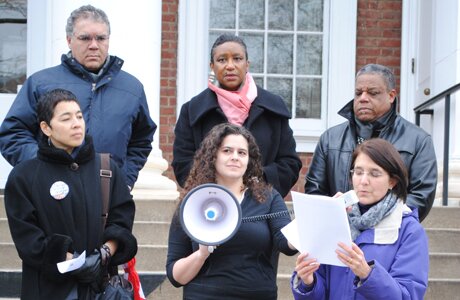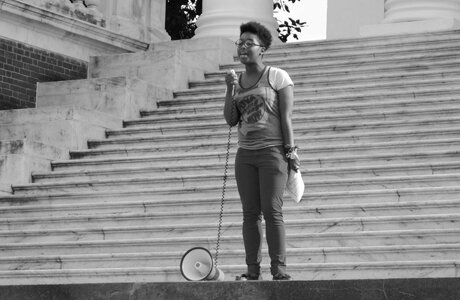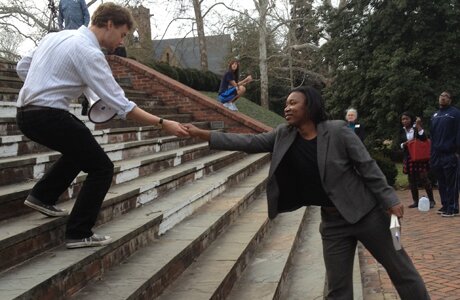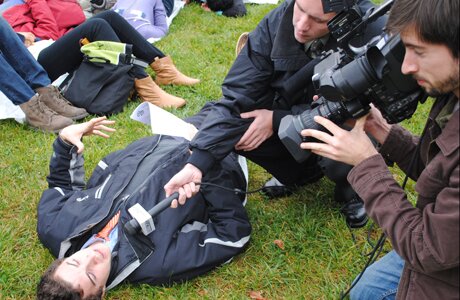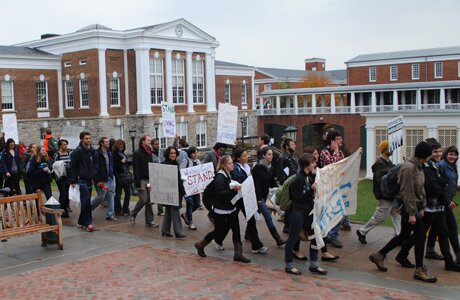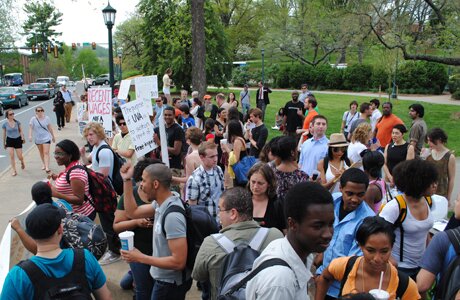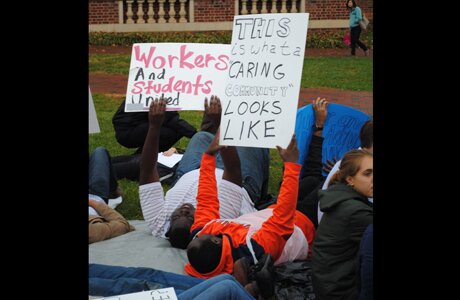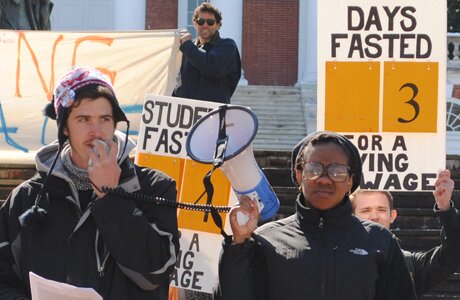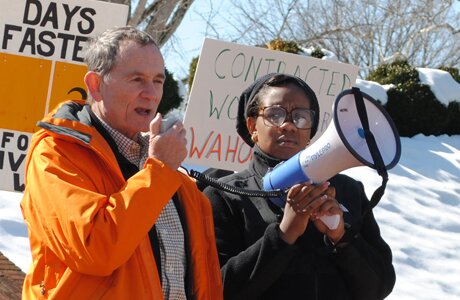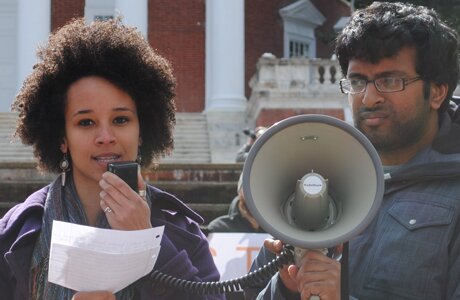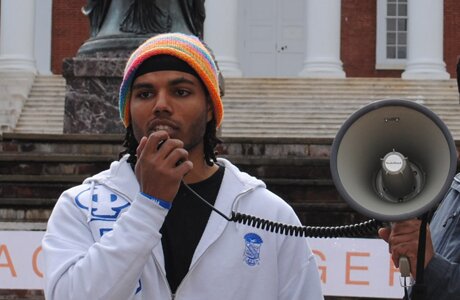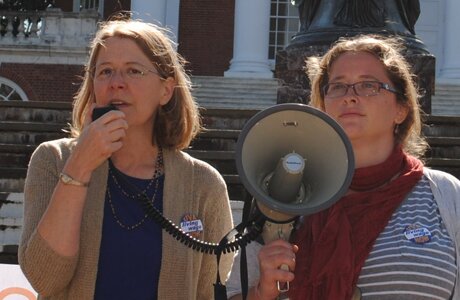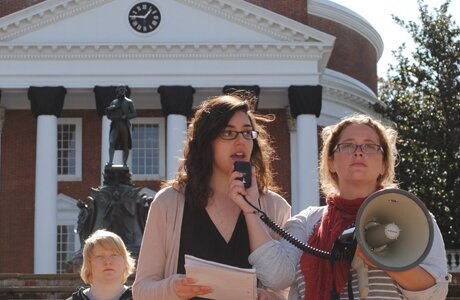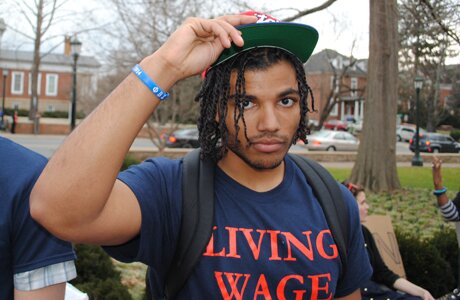The Case for a Living Wage
The fight for a living wage has been a long one, but one that is ours to win. Like our peers at other institutions, we as students in conjunction with the workers who make this university run every day, can pressure university administrators and the Board of Visitors to ensure that everyone who works on our campus can live with dignity in the Charlottesville community.
The state of Virginia is governed by a number of regulations that underscore the importance of action and change at the university level. First, as a Dillon Rule state, local municipalities cannot pass city-wide minimum wage ordinances. That means that in contrast to cities like Seattle, where the City Council recently approved a $15 city-wide minimum wage, the state of Virginia as a whole must vote to raise the minimum wage: individual communities cannot set their own base wage. But even a jump in the state-wide wage wouldn’t take into account the different costs associated with living in the various cities, towns, and counties in Virginia. Like the federal minimum wage, while a state-wide wage increase would help Virginia’s hard working citizens, it would not be tied to inflation or the cost of living in any specific locale.
But the need for local action at the university level has also raised a number of additional questions. Students often ask whether or not it’s legal for the University of Virginia to demand that contractors like Aramark pay a base wage above the federal minimum wage. Many of these questions have been fueled by UVA administrators themselves. In 2006, then-President John Casteen solicited a letter about UVA’s ability to demand that university contractors like Aramark pay a living wage from recently-indicted former-governor Bob McDonnell while he was serving as state Attorney General. Addressed to then Vice-Provost of Operations Leonard Sandridge, the Attorney General’s letter was a public reaffirmation of the limitations placed on the powers of UVa’s Board of Visitors by the Public Procurement Act. But this letter is only an opinion, not a binding legal decision. Moreover, many public entities throughout Virginia, including the City of Charlottesville, mandate that their contractors pay a base wage higher than that of the federal minimum wage of $7.25. These contracts have never been challenged in court.
These evasive tactics are typical of UVA administrators’ responses to the demand for a living wage. The official university statement on wages emphasizes that UVA is “the employer of choice” proudly touting its status as a desirable employer for people in the central Virginia region. However, the health and education related benefits that come along with a full time position at the university don’t necessarily apply to most lowest paid workers–neither do they put food on the table–especially for those who work part time and under contractors. With every push for higher wages for UVA workers, administrators and Board of Visitors members insist that a) the budget is fixed at the start of each year and there is no flexibility within it, and b) that due to state cuts, they do not have the funds to pay their employees more money. Yet we have consistently seen that this is not the case. Most recently, the University has found a way to pay private security guards upwards of $15 an hour to police fraternity parties. In addition, in 2012, the University fired former COO Michael Strine for colluding with Helen Dragas on Sullivan’s ouster, giving him a $250,000 severance package to get lost. A fixed and tight budget, indeed.
These examples underscore the need and potential for student activism at UVA and in the surrounding community. We’ve already seen the efficacy of local pressure: in 2001 the City of Charlottesville passed its own living wage ordinance. The ordinance mandates that all city employees be paid a living wage as calculated by the Economic Policy Institute and tied to inflation. Yet the University of Virginia, one of the wealthiest public institutions in the world, with an annual budget nearly 1,000 times that of the City of Charlottesville, continues to undercut these efforts, paying its workers insufficient wages and driving up poverty rates in the city of Charlottesville and Albemarle County. When UVA decides to underpay its workers, you, the taxpayer, pick up the tab.
We know the need is dire. The campaign has made available a handful of anonymous testimonies detailing the harsh economic realities of some direct and contracted UVa workers. The published testimonies include the disrespectful hierarchical treatment from supervisors and the lack of flexible working conditions workers continue to be subject to. One university staff member who gave his testimony on March 2012 explained: “There are people who work full time at UVA and go to the food bank to get food…there is no collective bargaining, there’s no worker’s voice and anyone who makes a lot of noise sees the door.”
But we can win. 8 of the top 10 universities in the United States pay a living wage. These wage increases were almost all won through student-led campaigns, in solidarity with workers, that successfully pressured their administrators to do what’s right.
In fact, the Living Wage Campaign’s efforts have also benefited the Charlottesville community at large. After the conclusion of the Campaign’s hunger strike in Spring 2012, the City of Charlottesville raised its minimum wage to $13 per hour, plus benefits, the exact package the Campaign had been demanding from the UVA administration.
Violence against black women and men in the U.S. has recently led to a burst of protests, marches, blockades, and die-ins across the country. Our own University President Teresa Sullivan has decried the violence against black youths in a statement to the entire campus. Yet we assert that the devaluation of black lives is also structural: it is present in the continued denial of economic justice and the limited access to education, healthcare, housing, and other social goods. If Teresa Sullivan truly wanted to affirm that black lives, and indeed the lives of all working people, matter, then she would agree to pay the hardworking employees of this public institution a living wage. It is our job to give her no choice but to do so.
Resources:
Economic Policy Institute Family Budget Calculator
Center for American Progress articles and white papers on labor
Student Union of Michigan–”Explaining Tuition Hikes at the University of Michigan” and “Construction not Instruction: Bonds and Buildings at the Public University”
UVA statement – competitive compensation issues – http://www.virginia.edu/wages/
Statement from Michael Strine (Feb 2012) – http://www.virginia.edu/wages/strine120229.html
Statement from Attorney General McDonnel – http://www.virginia.edu/presidentemeritus/spch/06/attorneygeneral060321.pdf
UVA Staff Union Shuts down – http://www.c-ville.com/UVA_staff_union_will_shut_down/#.UmlPARDWP48
http://www.dailyprogress.com/news/uva-staff-deserve-living-wage/article_dbef517a-9f87-5888-b2f4-7add21725126.html
No Sodexo at the University of Virginia!
Thank you for your support in our fight to keep Sodexo off the University of Virginia’s campus!
This morning, in a meeting with members of the Living Wage Campaign, Executive Vice President and COO Patrick Hogan verbally confirmed that Sodexo will NOT be the next dining service provider at the University!
We celebrate the fact that the workers on the UVa campus will not be subjected to Sodexo’s unjust labor practices.
Hogan also noted that UVa considers three primary criteria when selecting contractors: cost, student services and satisfaction, and maintaining the conditions of facilities. When asked what role worker conditions play in these decisions, he responded that the wage and labor policies of a contractor are not the business of the University.
We insist that the well-being of those who make this campus run every day IS the business of the University and that their compensation and treatment should be made a priority.
Hogan suggested a follow-up meeting be scheduled after the new dining service contract is announced, which he says will occur in the next 30 days. In this meeting, we intend to continue to advocate for the fair compensation of our workers regardless of which corporation is contracted.
We will continue to update you on this issue and invite you to join us after the new dining service contract is signed to tell Hogan and the rest of the administrators at the University of Virginia that workers, including contracted workers, are ‘Hoos, too.
WAHOOWA!
In solidarity,
Workers and Students United for a Living Wage at the University of Virginia

